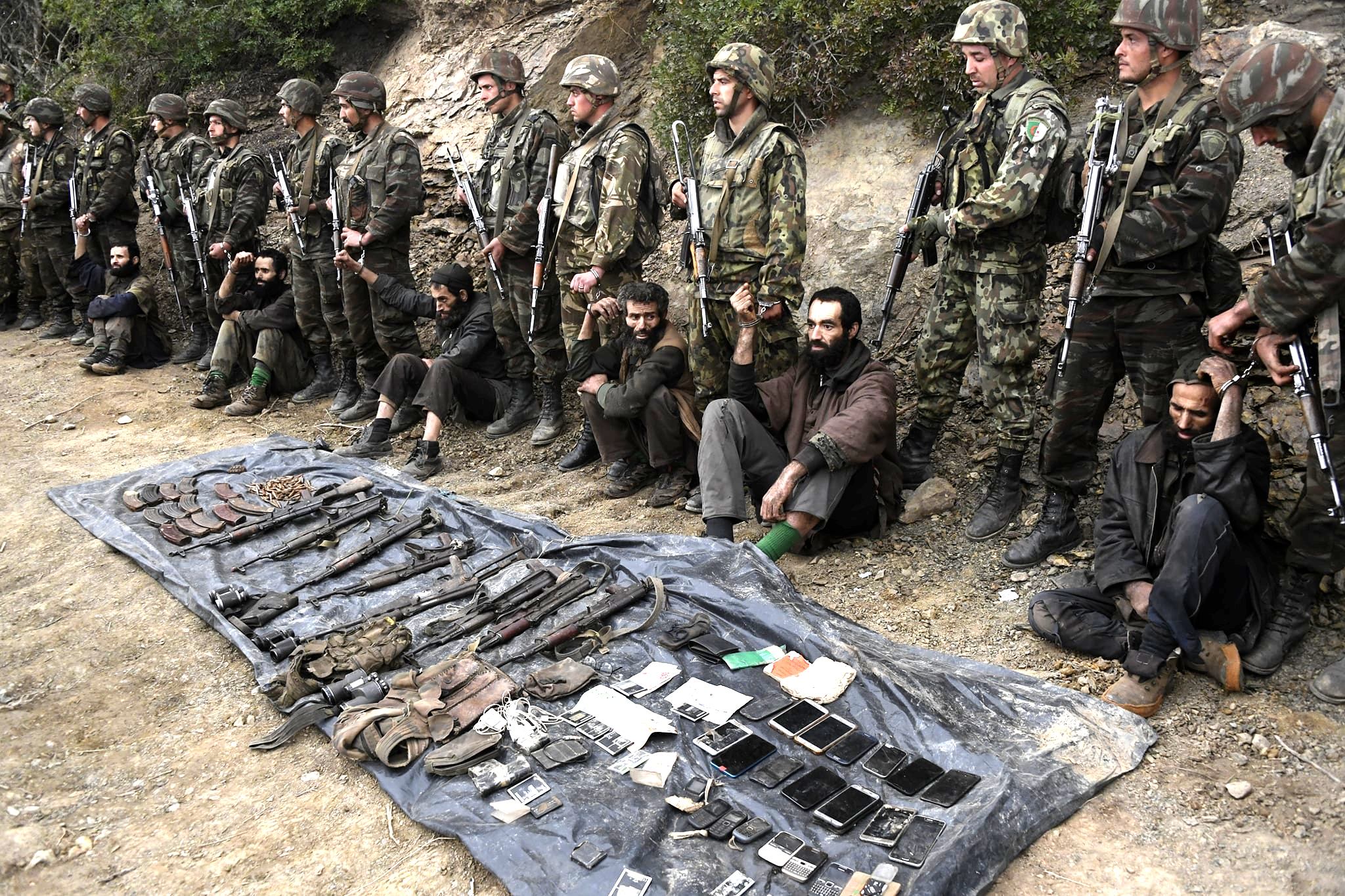Earlier this year, Algeria carried out two military operations targeting Al Qaeda militants holed up in the rugged mountain highlands east of the country. In February, seven militants were killed, most of whom had joined terrorist groups 15 years ago. In March, seven militants were arrested, and one killed in confrontations with Algerian army forces. It is worth noting that there has been increased media activity by Al Qaeda’s branch in the Maghreb (AQIM) particularly after Algerian military operations last March, in an attempt to counter the effects of Algeria’s military operations on an already declining level of AQIM in Algeria.
A review of the past few months shows a significant increase in AQIM press releases and statements, particularly in May, when three videos were released: the first an interview with Mujahid Abdul Mohsen Abi Jalibib”; the second featuring Abi Khalil Idris; and the third a sermon on the occasion of Eid al-Fitr, 1443 AH, by Hamza Abu al-Mu’tasim. An analysis of the three videos, as well as the organization’s statement of 29 March 2022, following the Algerian military operations, reveal the implications of this increased media activity:
Difficult times: The content released by AQIM reveals the organization perceives itself as enduring difficult times, calling on its followers to practice patience and endurance, and await God’s relief. Such rhetoric is usually used by Islamist militant organizations when they have endured repeated blows and significant losses and is directed primarily at organization insiders and militants. It aims to maintain internal cohesion, and to prevent possible schisms and defections that could amplify the debilitating impact of the death and capture of militants last February and March on the organization. This purpose is indicated by the release of the Eid al-Fitr sermon about a month after the occasion itself.
Demonstrating presence on the ground: While the organization acknowledged the impact of the Algerian army’s operations by broadcasting videos of the confrontations and images of those killed, it still seeks to demonstrate it has presence on the ground. It attempted to do so by publishing an interview with a member known by the alias Abdelmohsen Abu Jalibib, who is based in a mountainous region of Skikda, Algeria. This was aimed at refuting Algerian military statements to the effect that the AQIM had been eradicated in that area.
Recruitment efforts: The video mentioned above describes the experience of a new recruit, who recently joined the organization, thereby encouraging others to follow his example, and demonstrating that there is already in place in this mountainous region a core presence that can be built on. AQIM s keen to recruit new members to recoup its losses, and views Salafi Jihadists as a possible source of these recruits.
Countering the threat of ideological disintegration: The disintegration or weakening of the organizations’ ideological foundations is a threat to its endurance as a structure as well. Therefore, AQIM has dedicated a publication to counter calls for a cessation of violence and the abandonment of arms made by Asim Abu Hayan, a former Al Qaeda leader captured by the Algerian army, known to have served as a Sharia judge. AQIM fears Abu Hayyan’s influence can affect its own members as well as those belonging to the jihadist Salafist movement.
AQIM’s efforts to regroup and upgrade activities in Algeria will, however, be faced with significant obstacles, most notably:
Preemptive military operations: The Algerian authorities continue to proactively strike terrorist elements and groups related to both Al Qaeda and ISIS. Over the past few years, the Algerian military has managed to suppress and neutralize ISIS efforts to reconstitute. Algeria also announced the dismantling of a number of terrorist cells over the past few months under a proactive initiative to dismantle terrorism in the Sahel region over the coming period. At the 16th Extraordinary Summit of the African Union Council on Terrorism and Unconstitutional Changes of Governments in Africa, mechanisms were put forward to strengthen the fight against terrorism on the continent and neutralize any threats of terrorist counter attacks.
The disintegration of Al Qaeda’s core: The information released by the Algerian Ministry of Defense, corroborated by Al Qaeda’s obituaries and media releases, together indicate that AQIM’s “core” organizational presence in Algeria has been significantly weakened and fragmented. This greatly undermines the organization’s ability to regroup in the near future. The members lost had long organizational and operational experience in Algeria, having joined 15 years ago, and will therefore be difficult to replace.
Weak foundations in Algeria: AQIM’s has, to start with, weak foundations in Algeria. It was unable to establish strong foundations there due to tight security measures, and its proximity to other areas in the Sahel region where opportunities for activity are greater. It has been unable to attract recruits from outside Algeria over the past few years, although Western analysts believe that since 2011, AQIM’s rhetoric has been partly focused on that goal. It is worth noting, however, that a recent publication by AQIM highlighted that one of its members is a Tunisian citizen.
Recruitment challenges: AQIM propaganda and recruitment efforts in Algeria sought to focus on domestic issues rather that abstract ideological arguments to attract supporters. It sought to take advantage of the 2011 civil unrest, leveraging local issues and stirring public opinion against the government. However, as protests and unrest die down, the climate will not be conducive for AQIM recruitment. It is worth noting that some Western studies report Algerians are not inclined to respond to calls for taking up arms, following the ordeal experienced by the country during the Black Decade.
In sum, it is unlikely that AQIM will be able to reassert its presence and activity in Algeria in the foreseeable future, following the blows it has recently received at the hands of the Algerian army. It is worth noting that Al Qaeda is still attracting new affiliates in the region. For example, “Ansar Al-Muslimeen fi Bilad Al-Sudan”, active in Nigeria, became affiliated to A Qaeda last year, but this is unlikely to impact the situation in Algeria.


